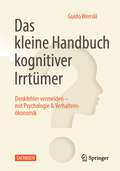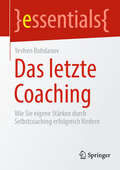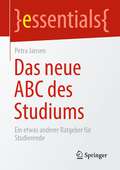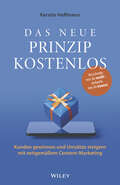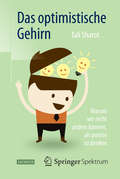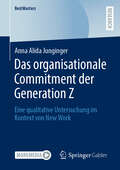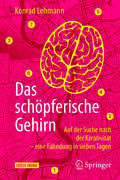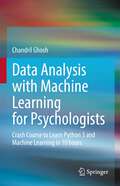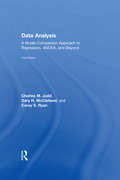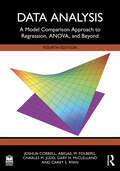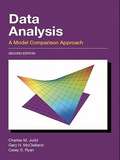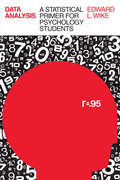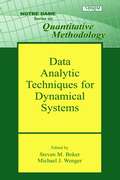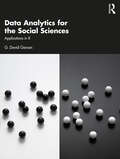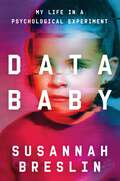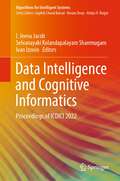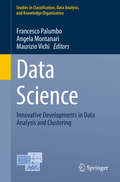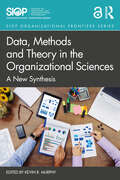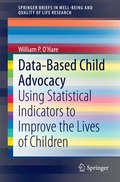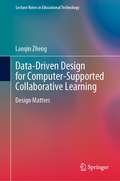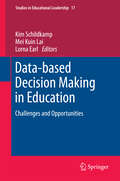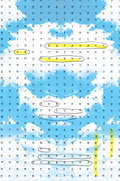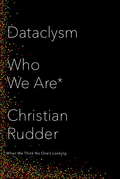- Table View
- List View
Das kleine Handbuch kognitiver Irrtümer: Denkfehler vermeiden – mit Psychologie & Verhaltensökonomik
by Guido Wenski„Irren ist menschlich" – das alte Sprichwort wird auch durch die Wissenschaft bestätigt: Uns Menschen unterlaufen ständig Denkfehler. Dieses Buch stellt über 300 solcher kognitiver Irrtümer und Verzerrungen, die im Alltag auf uns lauern, auf unterhaltsame Art vor: Ob trügerische Erinnerungen, Beeinflussung unserer Entscheidungen durch Gefühle, Phänomene der Selbstüberschätzung, falscher Umgang mit Geld oder Wahrscheinlichkeiten oder sogar Sichtweisen, die zu Diskriminierung führen – unser komplexes Gehirn neigt zu vorhersagbaren Schnellschüssen, die in der Vorzeit eine Grundvoraussetzung zur Erhaltung unserer Art waren, in heutiger Zeit aber fatale Folgen haben können. Doch es gibt Hoffnung, denn Psychologie und Verhaltensökonomik bieten neben Erklärungsansätzen auch Hinweise zum Umgang mit kognitiven Irrtümern aller Art. Mit diesem Baukasten und zahlreichen Tipps lassen sich falsche Entscheidungen vermeiden. Und so ist dieses kleine Handbuch menschlicher Denkfehler gleichzeitig ein Ratgeber für den täglichen „Hürdenlauf" durch unseren komplizierten Alltag.
Das letzte Coaching: Wie Sie eigene Stärken durch Selbstcoaching erfolgreich fördern (essentials)
by Yevhen BohdanovWarum sind manche Menschen erfolgreicher und glücklicher als andere? Geht es um Talente oder Genies? Nein! Ihre Stärken haben Sie genügend! Unser Problem ist nicht, dass wir weniger Stärken als nötig haben; unser Problem ist, dass wir das Vorhandene nicht anwenden. Welche Stärken haben Sie persönlich, wie lässt es sich feststellen und wie können Sie sie umsetzen? Was wird Ihnen nie gelingen, auch wenn Sie sich anstrengen? Im Buch nehme ich Sie an die Hand und zeige Ihnen an Praxisbeispielen sowie mehrjähriger Beobachtungen meinen ganz pragmatischen Ansatz. Viel Spaß und Erfolg!
Das musikalische Entspannungsbuch für Kinder und Eltern: Stress abbauen durch Lieder, leicht spielbare Instrumente und illustrierte Geschichten
by Zita MartusImmer mehr Kinder stehen schon im frühen Kindesalter unter Stress durch Überforderung und Reizüberflutung! Wenn Sie auch bei Ihrem Kind erleben, dass es „nicht zur Ruhe“ kommt, oder Sie kindlichem Stresserleben vorbeugen möchten, dann bietet Ihnen dieser Ratgeber eine informative und musikalisch-unterhaltsame Hilfe an! Nach einigen grundlegenden Informationen für Eltern, wie Entspannungsmomente in den Alltag integriert werden können und warum diese so wichtig sind, widmet er sich der Kraft der Musik. Denn diese bietet – gerade im Kleinkindalter – fast magische Möglichkeiten, über das gemeinsame Musizieren mit einfachen musiktherapeutischen Instrumenten zu mehr Ruhe und innerer Ausgeglichenheit zu kommen. Neben Anleitungen für Eltern wird die Thematik in einem Vorleseteil mit liebevollen bebilderten Geschichten im Stile eines Bilderbuches den kleinen Mitleser*innen vermittelt. Schöpfen Sie mit Ihrem Kind in gemütlichen Vorlese- und Musizierstunden gemeinsam Kraft aus der Musik!
Das neue ABC des Studiums: Ein etwas anderer Ratgeber für Studierende (essentials)
by Petra JansenMit dem Studium beginnt eine neue Zeit der Eigenständigkeit. Es ist ein Sprung in etwas Unbekanntes. Der Studienführer bietet Anregungen, das Studium als Möglichkeit der eigenen persönlichen Entwicklung zu sehen. 26 nach dem Alphabet geordnete Stichworte regen zum Innehalten und Nachdenken an. Manche mögen inspirieren und berühren. Das Buch dient als Impulsgeber. Es kann helfen, dankbar durch das Studium zu navigieren, ohne den Kompass zu verlieren. Stichworte wie zum Beispiel Hoffnung, Kreativität, Mitgefühl und Unabhängigkeit werden thematisiert: Welche Bedeutung haben sie auf der einen Seite für die eigene Entwicklung, auf der anderen Seite aber auch im Kontext des Lernens für den Erfolg im Studium? Und wie lassen sich diese Eigenschaften erlernen und praktizieren?Ohne Anspruch auf Vollständigkeit werden die Themen durch Zitate, Reflexionen und Literaturtipps ergänzt. Am Ende bleibt vielleicht der Eindruck, dass das Studium viel mehr ist als die Jagd nach Credit-Points. Es bietet eine große Chance für die persönliche Entwicklung.
Das neue Prinzip kostenlos: Kunden gewinnen und Umsätze steigern mit zeitgemäßem Content-Marketing
by Kerstin Hoffmann"Verschenke, was du weißt - um das zu verkaufen, was du kannst!" - Fachkenntnisse als Basis für ein erfolgreiches Content-Marketing: Die renommierte Kommunikations- und Strategieberaterin Dr. Kerstin Hoffmann zeigt, wie Unternehmen jeder Größe ebenso wie einzelne Freiberufler und Solopreneure zu mehr Sichtbarkeit, einer besseren Marktposition, neuen Kunden und höheren Umsätzen gelangen. "Das neue Prinzip kostenlos" bietet Einsteigern und Fortgeschrittenen das passende Handwerkszeug, um ihre eigene Vorgehensweise zu entwickeln und zu dauerhaftem Erfolg zu führen. Der praxisnahe Ratgeber führt Sie durch die gesamte Content-Marketing-Strategie: Wie lässt sich Wissen attraktiv aufbereiten? Welche sind die richtigen Plattformen und Medien für die Verbreitung? Wie wandeln Sie die Aufmerksamkeit Ihrer Zielgruppen in gut bezahlte Aufträge um? Die neue Fassung dieses Standardwerks ist viel mehr als eine komplett überarbeitete 3. Auflage: Sie spiegelt den aktuellen Stand der digitalen Kommunikation wider, greift aktuelle Trends sowie Praxiserfahrungen auf. Wertvolle Tools und Checklisten sowie ausführliche Anleitungen sind hinzugekommen. Eines der ganz neuen Kapitel befasst sich mit dem Thema Mitarbeiter-Markenbotschafter (Corporate Influencer) mit Fokus auf deren Rolle im Content-Marketing von Unternehmen.
Das optimistische Gehirn: Warum wir nicht anders können, als positiv zu denken
by Tali SharotDas Gehirn ist die Zuversicht in Person Wie erzeugt unser Gehirn Hoffnung? Wie bringt es uns dazu, positiv in die Zukunft zu blicken? Was geschieht, wenn ihm das nicht gelingt? Wie unterscheiden sich die Gehirne von Optimisten und Pessimisten? Warum ist für die einen das Glas halbvoll, für die anderen halbleer? Tali Sharots These: Optimismus ist so überlebenswichtig für uns, dass er in unserem kompliziertesten Organ, dem Gehirn, fest verankert ist. ,,Wir haben die rosarote Brille auf, als Acht- wie als Achtzigjährige . . . Dabei sind wir uns unserer Neigung zum Optimismus oft gar nicht bewusst. Im Grunde ist der unrealistische Optimismus gerade deshalb so machtvoll, weil er - wie viele andere Illusionen - gar nicht vollständig unserer bewussten Entscheidung zugänglich ist. " Faszinierend . . . Selbst wenn Sie ein eingefleischter Zyniker sind, werden Sie überrascht sein zu erfahren, dass Ihr Gehirn eine rosarote Brille aufhat, ob Sie das nun mögen oder nicht. National Public Radio Sharot beschreibt ihre Forschung in packenden Geschichten und macht dabei die komplizierte Wissenschaft leicht zugänglich. Ein Buch für alle, die jene biologischen Prozesse verstehen wollen, die unsere Sicht auf die Welt bestimmen. Positive Psychology News Daily Ein intelligent geschriebener Bericht über die Neigung der meisten Menschen, das Leben optimistisch zu sehen. New York Journal of Books ____ Die Neurowissenschaftlerin Tali Sharot erkundet in diesem Buch unsere Neigung zum Optimismus, die auf neuronaler Ebene in unserem Gehirn festgeschrieben ist und entscheidend darüber mitbestimmt, wie wir unser Leben leben. Die meisten Menschen besitzen, wie die Psychologie schon lange weiß, eine unverbesserlich positive Weltsicht - auch wenn es ihnen selbst gar nicht bewusst ist. Vielleicht ist Optimismus sogar entscheidend für unsere Existenz. Tali Sharots Untersuchungen und Experimente auf dem Gebiet der Kognitionswissenschaft gewähren uns tiefe Einblicke in die biologischen Grundlagen des positiven Denkens. In ihrem leicht lesbaren Sachbuch zum Thema geht sie vielen spannenden Fragen auf den Grund: warum wir mit unseren Vermutungen darüber, was uns glücklich machen wird, so oft danebenliegen, welche Wirkung es hat, wenn wir Ereignisse vorwegnehmen oder fürchten, wie unser Gehirn Gefühle der Zuversicht und Hoffnung erzeugt und was passiert, wenn es sich irrt, wie sich die Gehirne von Optimisten und Pessimisten unterscheiden, wie Emotionen unser Erinnerungsvermögen beeinflussen oder wie unser unrealistischer Optimismus unsere finanziellen, beruflichen und emotionalen Entscheidungen prägt Das optimistische Gehirn ist eine wissenschaftlich anspruchsvolle und gleichzeitig unterhaltsame Lektüre, die uns einen neuen Blick auf die Funktionsweise des Gehirns vermittelt.
Das organisationale Commitment der Generation Z: Eine qualitative Untersuchung im Kontext von New Work (BestMasters)
by Anna Alida JungingerDer Fachkräftemangel und frühzeitige Fluktuationen fordern Organisationen zu Veränderungen heraus, um Mitarbeitende zu halten. Die Generation Z betritt mit neuen Anforderungen den Arbeitsmarkt, während New Work neue Möglichkeiten für die Arbeitswelt bietet. Unternehmen sollten dahingehend ein Verständnis entwickeln, um das organisationale Commitment von Beschäftigten zu stärken und die Chancen auf den Verbleib beim Arbeitgeber zu steigern. Ziel dieser Ausarbeitung ist die Erarbeitung eines Konzepts mit Handlungsempfehlungen für Unternehmen zur Steigerung des organisationalen Commitments der Generation Z unter Berücksichtigung von Praktiken im Rahmen von New Work. Die Untersuchung stellt die Forschung des organisationalen Commitments, von New Work sowie der Generation Z im Arbeitskontext dar, um den Überschneidungsgrad dieser Bereiche aufzuzeigen. Ergänzend wurden leitfadengestützte problemzentrierte Interviews mit Beschäftigten der Generation Z hinsichtlich ihrer persönlichen Relevanz des organisationalen Commitments sowie möglichen Einflussfaktoren darauf durchgeführt. Nach einer qualitativen Inhaltsanalyse nach Mayring werden für Organisationen Maßnahmen zur Stärkung des organisationalen Commitments der Generation Z im Rahmen eines Konzepts im Kontext von New Work aufgezeigt.
Das perfekte Geschenk: Zur Psychologie des Schenkens
by Bernd StaussWerden Sie zum Geschenke-Profi! Dieses wissenschaftlich fundierte, kurzweilige Sachbuch hilft Ihnen, die Psychologie des Schenkens zu verstehen und anzuwenden. Und da gibt es viel zu entdecken und zu verbessern, denn wir alle praktizieren lebenslang ein bestimmtes Schenkverhalten, ohne genauer darüber nachzudenken – leider manchmal mit negativen Folgen…. Ziehen Sie dieses Buch zu Rate und gewinnen Sie: Mehr Freude und weniger Frust beim Schenken!Welche „heimlichen“ Regeln des Gebens und Nehmens befolgen wir, ohne es zu wissen?Welche Botschaften senden wir mit unseren Geschenken?Wie beeinflussen bestimmte Eigenschaften – wie die Höhe des Preises, das Einfühlungsvermögen und die aufgewandte Mühe - die Zufriedenheit mit einem Geschenk?Wie bewahren Sie den familiären Frieden zu Weihnachten durch richtiges Schenken?Welche Fehler sollten Sie beim Schenken in romantischen Beziehungen vermeiden?Wie gehen Sie bei ganz besonders schwierigen Empfängern vor?Wann ist ein Geldgeschenk angebracht und wann nicht?
Das schöpferische Gehirn: Auf der Suche nach der Kreativität – eine Fahndung in sieben Tagen
by Konrad LehmannDas Geheimnis des Geistesblitzes – entschlüsselt Dieses Buch ist eine Einladung zu einer aufregenden Spurensuche: Erkunden Sie Schritt für Schritt die neuronalen Grundlagen der menschlichen Kreativität. Sie werden dabei unweigerlich einige Überraschungen erleben. Die Kulturgeschichte des Menschen ist nicht zuletzt die Geschichte großer Gedanken und genialer Neuerungen – und damit die Geschichte geistsprühender Gehirne. Seit wenigen Jahren erst ergründen die Neurowissenschaften, was in solchen Gehirnen vorgeht, wenn sie neue Ideen hervorbringen und verwirklichen. Der erfahrene Hirnforscher Konrad Lehmann gewährt uns einen ebenso unterhaltsamen wie informativen Einblick in diese fesselnde Forschungsrichtung: Was ist eine kreative Persönlichkeit? Sind Genies wirklich verrückt? Woher kommt der Antrieb, kreativ zu sein? Welche Gehirngebiete sind aktiv, wenn wir rappen oder jazzen? Und welche, wenn wir eine zündende Idee haben? Warum kommen die besten Einfälle im Schlaf? Die Suche nach der Kreativität im Gehirn ist spannend wie ein Krimi. Begleiten Sie den Autor und Commissario Prefrontale auf einer doppelten Fahndung: in den Gassen einer sich verändernden Stadt und durch die dunklen Windungen des Gehirns.___"Das schöpferische Gehirn" ist die erste deutschsprachige Einführung in die neurobiologische Kreativitätsforschung, die sich an ein allgemeines Publikum richtet. Das Buch vereint wissenschaftliche Sorgfalt, kulturelle Bildung und stilistisches Feuer. Komplexe Zusammenhänge werden unterhaltsam und bildhaft vermittelt, wozu die allegorische Rahmenhandlung beiträgt.
Data Analysis with Machine Learning for Psychologists: Crash Course to Learn Python 3 and Machine Learning in 10 hours
by Chandril GhoshThe power of data drives the digital economy of the 21st century. It has been argued that data is as vital a resource as oil was during the industrial revolution. An upward trend in the number of research publications using machine learning in some of the top journals in combination with an increasing number of academic recruiters within psychology asking for Python knowledge from applicants indicates a growing demand for these skills in the market. While there are plenty of books covering data science, rarely, if ever, books in the market address the need of social science students with no computer science background. They are typically written by engineers or computer scientists for people of their discipline. As a result, often such books are filled with technical jargon and examples irrelevant to psychological studies or projects. In contrast, this book was written by a psychologist in a simple, easy-to-understand way that is brief and accessible. The aim for this book was to make the learning experience on this topic as smooth as possible for psychology students/researchers with no background in programming or data science. Completing this book will also open up an enormous amount of possibilities for quantitative researchers in psychological science, as it will enable them to explore newer types of research questions.
Data Analysis: A Model Comparison Approach To Regression, ANOVA, and Beyond, Third Edition
by Charles M. Judd Carey S. Ryan Gary H. McClellandData Analysis: A Model Comparison Approach to Regression, ANOVA, and Beyond is an integrated treatment of data analysis for the social and behavioral sciences. It covers all of the statistical models normally used in such analyses, such as multiple regression and analysis of variance, but it does so in an integrated manner that relies on the comparison of models of data estimated under the rubric of the general linear model. Data Analysis also describes how the model comparison approach and uniform framework can be applied to models that include product predictors (i.e., interactions and nonlinear effects) and to observations that are nonindependent. Indeed, the analysis of nonindependent observations is treated in some detail, including models of nonindependent data with continuously varying predictors as well as standard repeated measures analysis of variance. This approach also provides an integrated introduction to multilevel or hierarchical linear models and logistic regression. Finally, Data Analysis provides guidance for the treatment of outliers and other problematic aspects of data analysis. It is intended for advanced undergraduate and graduate level courses in data analysis and offers an integrated approach that is very accessible and easy to teach. Highlights of the third edition include: a new chapter on logistic regression; expanded treatment of mixed models for data with multiple random factors; updated examples; an enhanced website with PowerPoint presentations and other tools that demonstrate the concepts in the book; exercises for each chapter that highlight research findings from the literature; data sets, R code, and SAS output for all analyses; additional examples and problem sets; and test questions.
Data Analysis: A Model Comparison Approach to Regression, ANOVA, and Beyond
by Charles M. Judd Carey S. Ryan Gary H. McClelland Josh Correll Abigail M. FolbergThis essential textbook provides an integrated treatment of data analysis for the social and behavioral sciences. It covers all the key statistical models in an integrated manner that relies on the comparison of models of data estimated under the rubric of the general linear model.The text describes the foundational logic of the unified model comparison framework. It then shows how this framework can be applied to increasingly complex models including multiple continuous and categorical predictors, as well as product predictors (i.e., interactions and nonlinear effects). The text also describes analyses of data that violate assumptions of independence, homogeneity, and normality. The analysis of nonindependent data is treated in some detail, covering standard repeated measures analysis of variance and providing an integrated introduction to multilevel or hierarchical linear models and logistic regression.Highlights of the fourth edition include: Expanded coverage of generalized linear models and logistic regression in particular A discussion of power and ethical statistical practice as it relates to the replication crisis An expanded collection of online resources such as PowerPoint slides and test bank for instructors, additional exercises and problem sets with answers, new data sets, practice questions, and R code Clear and accessible, this text is intended for advanced undergraduate and graduate level courses in data analysis.
Data Analysis: A Model Comparison Approach, Second Edition
by Charles M. Judd Carey S. Ryan Gary H. McclellandThis completely rewritten classic text features many new examples, insights and topics including mediational, categorical, and multilevel models. Substantially reorganized, this edition provides a briefer, more streamlined examination of data analysis. Noted for its model-comparison approach and unified framework based on the general linear model, the book provides readers with a greater understanding of a variety of statistical procedures. This consistent framework, including consistent vocabulary and notation, is used throughout to develop fewer but more powerful model building techniques. The authors show how all analysis of variance and multiple regression can be accomplished within this framework. The model-comparison approach provides several benefits: It strengthens the intuitive understanding of the material thereby increasing the ability to successfully analyze data in the future It provides more control in the analysis of data so that readers can apply the techniques to a broader spectrum of questions It reduces the number of statistical techniques that must be memorized It teaches readers how to become data analysts instead of statisticians. The book opens with an overview of data analysis. All the necessary concepts for statistical inference used throughout the book are introduced in Chapters 2 through 4. The remainder of the book builds on these models. Chapters 5 - 7 focus on regression analysis, followed by analysis of variance (ANOVA), mediational analyses, non-independent or correlated errors, including multilevel modeling, and outliers and error violations. The book is appreciated by all for its detailed treatment of ANOVA, multiple regression, nonindependent observations, interactive and nonlinear models of data, and its guidance for treating outliers and other problematic aspects of data analysis. Intended for advanced undergraduate or graduate courses on data analysis, statistics, and/or quantitative methods taught in psychology, education, or other behavioral and social science departments, this book also appeals to researchers who analyze data. A protected website featuring additional examples and problems with data sets, lecture notes, PowerPoint presentations, and class-tested exam questions is available to adopters. This material uses SAS but can easily be adapted to other programs. A working knowledge of basic algebra and any multiple regression program is assumed.
Data Analysis: A Statistical Primer for Psychology Students
by Edward L. WikeThis book is intended for psychology majors and graduate students who are conducting experiments for the first time and are faced with the task of making sense out of their data. This much needed "how-to-do-it" text illustrates the application of statistical methods to the data from small samples. It also serves as a handbook, with twenty-two tables presented at the end of the text that will allow the student to carry out virtually every computation necessary in analyzing his data. Almost all of the examples and illustrations are drawn from actual experiments so that the student can see how professional scientists examine their data. The book also shows students the kinds of data that are encountered in psychological research, the kinds of questions investigators seek to answer, and how these questions are approached.The author asserts that statistics is not an abstract discipline but a tool in research. However, the book also imparts a philosophy of data analysis and its meaning, a concern for questions of the function of data analysis and the interpretations that legitimately can be drawn from data. In brief, Data Analysis asks: What kinds of data are met in psychological research? What can we do with these data? What can we conclude as a result of this doing?The book will be invaluable for students who, even though they may have taken a previous statistics course, are still unsure of what statistical techniques should be used in interpreting their data.
Data Analytic Techniques for Dynamical Systems (Notre Dame Series On Quantitative Methodology Ser.)
by Steven M. Boker Michael J. WengerEach volume in the Notre Dame Series on Quantitative Methodology features leading methodologists and substantive experts who provide instruction on innovative techniques designed to enhance quantitative skills in a substantive area. This latest volume focuses on the methodological issues and analyses pertinent to understanding psychological data from a dynamical system perspective. Dynamical systems analysis (DSA) is increasingly used to demonstrate time-dependent variable change. It is used more and more to analyze a variety of psychological phenomena such as relationships, development and aging, emotional regulation, and perceptual processes. The book opens with the best occasions for using DSA methods. The final two chapters focus on the application of dynamical systems methods to problems in psychology such as substance use and gestural dynamics. In addition, it reviews how and when to use: time series models from a discrete time perspective stochastic differential equations in continuous time estimating continuous time differential equation models multilevel models of differential equations to estimate within-person dynamics and the corresponding population means new SEM models for dynamical systems data Data Analytic Techniques for Dynamical Systems is beneficial to advanced students and researchers in the areas of developmental psychology, family studies, language processes, cognitive neuroscience, social and personality psychology, medicine, and emotion. Due to the book’s instructive nature, it serves as an excellent text for advanced courses on this particular technique.
Data Analytics for the Social Sciences: Applications in R
by G. David GarsonData Analytics for the Social Sciences is an introductory, graduate-level treatment of data analytics for social science. It features applications in the R language, arguably the fastest growing and leading statistical tool for researchers. The book starts with an ethics chapter on the uses and potential abuses of data analytics. Chapters 2 and 3 show how to implement a broad range of statistical procedures in R. Chapters 4 and 5 deal with regression and classification trees and with random forests. Chapter 6 deals with machine learning models and the "caret" package, which makes available to the researcher hundreds of models. Chapter 7 deals with neural network analysis, and Chapter 8 deals with network analysis and visualization of network data. A final chapter treats text analysis, including web scraping, comparative word frequency tables, word clouds, word maps, sentiment analysis, topic analysis, and more. All empirical chapters have two "Quick Start" exercises designed to allow quick immersion in chapter topics, followed by "In Depth" coverage. Data are available for all examples and runnable R code is provided in a "Command Summary". An appendix provides an extended tutorial on R and RStudio. Almost 30 online supplements provide information for the complete book, "books within the book" on a variety of topics, such as agent-based modeling. Rather than focusing on equations, derivations, and proofs, this book emphasizes hands-on obtaining of output for various social science models and how to interpret the output. It is suitable for all advanced level undergraduate and graduate students learning statistical data analysis.
Data Baby: My Life in a Psychological Experiment
by Susannah BreslinA Belletrist Book Pick for December 2023Lab Girl meets Brain on Fire in this provocative and poignant memoir delving into a woman's formative experiences as a veritable "lab rat" in a lifelong psychological study, and her pursuit to reclaim autonomy and her identity as a adult. What if your parents turn you into a human lab rat when you&’re a child? Will that change the story of your life? Will that change who you are? When Susannah Breslin is a toddler, her parents enroll her in an exclusive laboratory preschool at the University of California, Berkeley, where she becomes one of over a hundred children who are research subjects in an unprecedented thirty-year study of personality development that predicts who she and her cohort will grow up to be. Decades later, trapped in what she feels is an abusive marriage and battling breast cancer, she starts to wonder how growing up under a microscope shaped her identity and life choices. Already a successful journalist, she makes her own curious history the subject of her next investigation. From experiment rooms with one-way mirrors, to children&’s puzzles with no solutions, to condemned basement laboratories, her life-changing journey uncovers the long-buried secrets hidden behind the renowned study. The question at the gnarled heart of her quest: Did the study know her better than she knew herself? At once bravely honest and sharply witty, Data Baby is a compelling and provocative account of a woman&’s quest to find her true self, and an unblinking exploration of why we turn out as we do. Few people in all of history have been studied from such a young age and for as long as this author, but the message of her book is universal. In an era when so many of us are looking to technology to tell us who to be, it&’s up to us to discover who we actually are.
Data Intelligence and Cognitive Informatics: Proceedings of ICDICI 2022 (Algorithms for Intelligent Systems)
by I. Jeena Jacob Selvanayaki Kolandapalayam Shanmugam Ivan IzoninThe book is a collection of peer-reviewed best selected research papers presented at the International Conference on Data Intelligence and Cognitive Informatics (ICDICI 2021), organized by SCAD College of Engineering and Technology, Tirunelveli, India, during July 6–7, 2022. This book discusses new cognitive informatics tools, algorithms and methods that mimic the mechanisms of the human brain which lead to an impending revolution in understating a large amount of data generated by various smart applications. The book includes novel work in data intelligence domain which combines with the increasing efforts of artificial intelligence, machine learning, deep learning and cognitive science to study and develop a deeper understanding of the information processing systems.
Data Science: Innovative Developments in Data Analysis and Clustering (Studies in Classification, Data Analysis, and Knowledge Organization)
by Francesco Palumbo Angela Montanari Maurizio VichiInternational Federation of Classification Societies The International Federation of Classification Societies (lFCS) is an agency for the dissemination of technical and scientific information concerning classification and multivariate data analysis in the broad sense and in as wide a range of applications as possible; founded in 1985 in Cambridge (UK) by the following Scientific Societies and Groups: - British Classification Society - BCS - Classification Society of North America - CSNA - Gesellschaft fUr Klassification - GfKI - Japanese Classification Society - JCS - Classification Group ofItalian Statistical Society - CGSIS - Societe Francophone de Classification - SFC Now the IFCS includes also the following Societies: - Dutch-Belgian Classification Society - VOC - Polish Classification Section - SKAD - Portuguese Classification Association - CLAD - Group at Large - Korean Classification Society - KCS IFCS-98, the Sixth Conference of the International Federation of Classification Societies, was held in Rome, from July 21 to 24, 1998. Five preceding conferences were held in Aachen (Germany), Charlottesville (USA), Edinburgh (UK), Paris (France), Kobe (Japan).
Data, Methods and Theory in the Organizational Sciences: A New Synthesis (SIOP Organizational Frontiers Series)
by Kevin R. MurphyData, Methods and Theory in the Organizational Sciences explores the long-term evolution and changing relationships between data, methods, and theory in the organizational sciences. In the last 50 years, theory has come to dominate research and scholarship in these fields, yet the emergence of big data, as well as the increasing use of archival data sets and meta-analytic methods to test empirical hypotheses, has upset this order. This volume examines the evolving relationship between data, methods, and theory and suggests new ways of thinking about the role of each in the development and presentation of research in organizations. This volume utilizes the latest thinking from experts in a wide range of fields on the topics of data, methods, and theory and uses this knowledge to explore the ways in which behavior in organizations has been studied. This volume also argues that the current focus on theory is both unhealthy for the field and unsustainable, and it provides more successful ways theory can be used to support and structure research, and demonstrates the most effective techniques for analyzing and making sense of data. This is an essential resource for researchers, professionals, and educators who are looking to rethink their current approaches to research, and who are interested in creating more useful and more interpretable research in the organizational sciences.
Data-Based Child Advocacy: Using Statistical Indicators to Improve the Lives of Children (SpringerBriefs in Well-Being and Quality of Life Research #0)
by William P. O'HareThis book locates, organizes and summarizes information about the use of child indicators in an advocacy context. It provides a conceptual framework that allows readers to see a wide variety of work as part of a unified field. It provides a description of key concepts and illustrates these concepts by offering many examples from a range of countries and a wide variety of applications. It covers work from governments, non-governmental organization and academics. It describes such aspects as the use of data to educate and increase public awareness, as well as to monitor, set goals and evaluate programs serving children. A growing number of organizations and people are focusing on measuring and monitoring the well-being of children and these child well-being data are often employed in ways that go beyond what is typically considered scholarship. Many of these applications involve some type of advocacy activity. Yet, there is very little in the literature about the use of child indicators in an advocacy context. This book provides a framework for scholars in a variety of disciplines that will help them to structure their thinking about the use of such indicators in a public context.
Data-Driven Design for Computer-Supported Collaborative Learning: Design Matters (Lecture Notes in Educational Technology)
by Lanqin ZhengThis book highlights the importance of design in computer-supported collaborative learning (CSCL) by proposing data-driven design and assessment. It addresses data-driven design, which focuses on the processing of data and on improving design quality based on analysis results, in three main sections. The first section explains how to design collaborative learning activities based on data-driven design approaches, while the second shares illustrative examples of computer-supported collaborative learning activities. In turn, the third and last section demonstrates how to evaluate design quality and the fidelity of enactment based on design-centered research.The book features several examples of innovative data-driven design approaches to optimizing collaborative learning activities; highlights innovative CSCL activities in authentic learning environments; demonstrates how learning analytics can be used to optimize CSCL design; and discusses the design-centered research approach to evaluating the alignment between design and enactment in CSCL. Given its scope, it will be of interest to a broad readership including researchers, educators, practitioners, and students in the field of collaborative learning, as well as the rapidly growing community of people who are interested in optimizing learning performance with CSCL.
Data-based Decision Making in Education: Challenges and Opportunities (Studies in Educational Leadership #17)
by Mei Kuin Lai Lorna Earl Kim SchildkampIn a context where schools are held more and more accountable for the education they provide, data-based decision making has become increasingly important. This book brings together scholars from several countries to examine data-based decision making. Data-based decision making in this book refers to making decisions based on a broad range of evidence, such as scores on students' assessments, classroom observations etc. This book supports policy-makers, people working with schools, researchers and school leaders and teachers in the use of data, by bringing together the current research conducted on data use across multiple countries into a single volume. Some of these studies are 'best practice' studies, where effective data use has led to improvements in student learning. Others provide insight into challenges in both policy and practice environments. Each of them draws on research and literature in the field.
Database of Dreams
by Rebecca LemovJust a few years before the dawn of the digital age, Harvard psychologist Bert Kaplan set out to build the largest database of sociological information ever assembled. It was the mid-1950s, and social scientists were entranced by the human insights promised by Rorschach tests and other innovative scientific protocols. Kaplan, along with anthropologist A. I. Hallowell and a team of researchers, sought out a varied range of non-European subjects among remote and largely non-literate peoples around the globe. Recording their dreams, stories, and innermost thoughts in a vast database, Kaplan envisioned future researchers accessing the data through the cutting-edge Readex machine. Almost immediately, however, technological developments and the obsolescence of the theoretical framework rendered the project irrelevant, and eventually it was forgotten.
Dataclysm
by Christian RudderProvocative, illuminating, and visually arresting, Dataclysm is a portrait of how big data reveals our essential selves--and a first look at a revolution in the making. What is the secret to a stable marriage? How many gay people are still in the closet? Do we truly live in a postracial society? Has Twitter made us dumber? These are just a few of the questions Christian Rudder answers in Dataclysm, a smart, funny, irreverent look at how we act when we think no one's looking. For centuries we've relied on polling or small-scale lab experiments to study human behavior. Today a new approach is possible. As we live more of our lives online, researchers can finally observe us directly, in vast numbers and without filters. Data scientists can quantify the formerly unquantifiable and show with unprecedented precision how we fight, how we age, how we love, and how we change. Our personal data has been used to spy on us, hire and fire us, and sell us stuff we don't need. InDataclysm, Rudder uses it to show us who we are as people. He reveals how Facebook "likes" can predict, with surprising accuracy, a person's sexual orientation and even intelligence; how attractive women receive exponentially more job interview requests; and why you have to have haters to be hot. He charts the rise and fall of America's most reviled word through Google Search and examines the new dynamics of collaborative rage on Twitter. He shows how people express themselves, both privately and publicly. What is the least Asian thing you can say? Do people bathe more in Vermont or New Jersey? What do black women think about Simon & Garfunkel? Hint: They don't think about Simon & Garfunkel. Rudder also tracks human migration in real time, showing how groups of people move from certain small towns to the same big cities across the globe. And he grapples with the challenge of maintaining privacy in a world where these explorations are possible.
